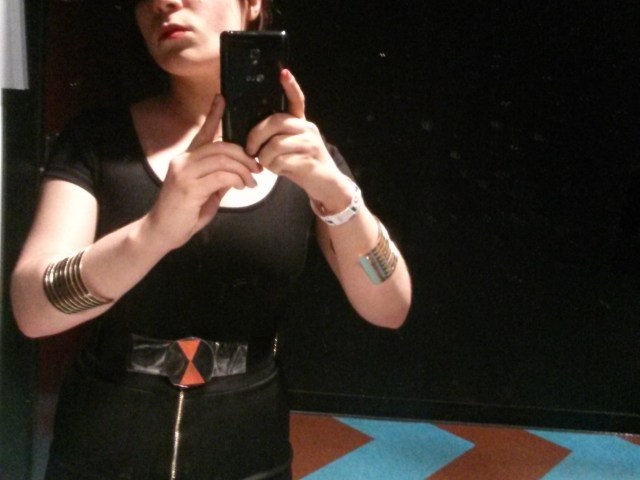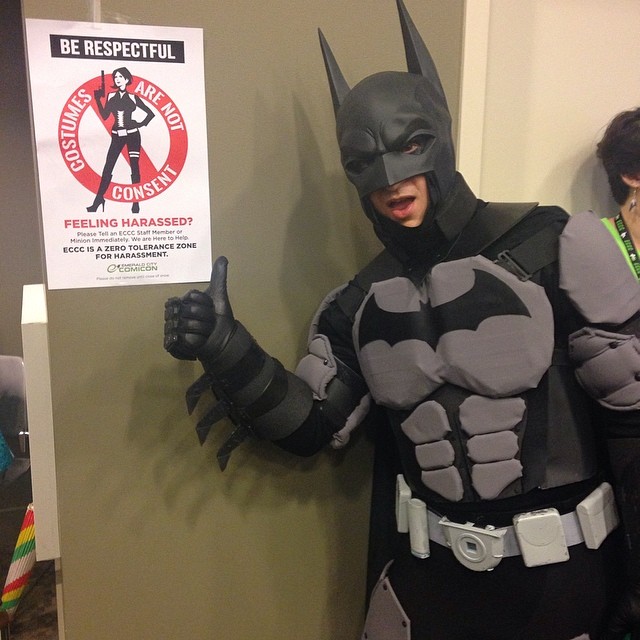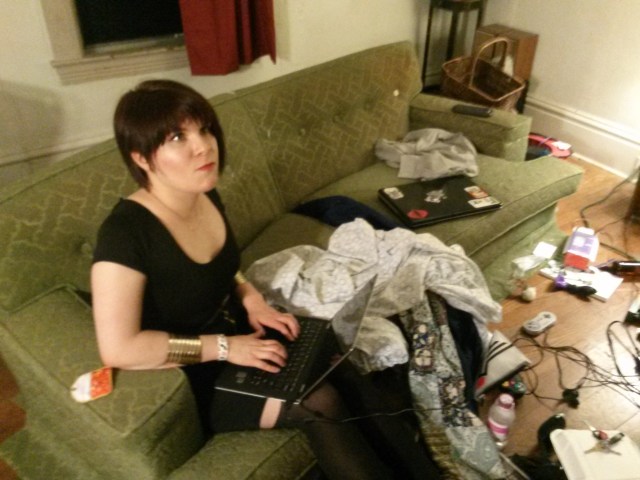feature image via shutterstock
This week was Batman’s 75th anniversary, and a local comics shop in my area celebrated by hosting a Batman Dance Party. There was cheap beer, great music (save for playing “Blurred Lines” at the beginning of the party), and more than 250 people dressed up as Batman, with a few popular villains mixed in. I dressed up as Black Widow, because, let’s face it, Batman wouldn’t last five minutes at the KGB. I danced around, drank, cheap beer, took rad selfies, and had an amazing time. More importantly, I was never grabbed, harassed, stalked or otherwise made to feel unwelcome at the event.

Unfortunately, safe spaces like this are not always the norm in the geek community.
Janelle Asselin surveyed 3,600 comics fans and professionals about their experiences with harassment in the comics and convention industry. The results were depressing as hell. 59% percent believed that harassment in comics was a problem, 25% reported harassment in the industry at work, events, and conventions. 8% had been groped, assaulted or raped at a comic convention.
This is what happens when the patriarchy dons a cape and a cowl. Combine a male-dominated industry (where many artists can’t seem to draw realistic breasts or spinal columns), entitled male NERD RAGE, Geek Social Fallacies, gatekeeping and rape culture, and you’ll get The 2013 Boston Comic Con’s FAQ featured the oh-so-helpful advice that “by wearing a costume in public you are tacitly giving approval that people take your photograph and immediately post it to the internet. That being said people taking photos should ask permission first.”
Ugh.
San Diego Comic Con is currently in progress, and this year the convention sent out an email to con attendees that briefly addressed harassment:
“Attendees must respect common sense rules for public behavior, personal interaction, common courtesy, and respect for private property. Harassing or offensive behavior will not be tolerated. Comic-Con reserves the right to revoke, without refund, the membership and badge of any attendee not in compliance with this policy.”
This comes after David Glanzer, SDCC’S director of marketing and public relations explained in an interview with Comic Book Resources that a more detailed policy against sexual harassment would lead the media to believe that harassment in cons was an issue, and would give con-goers the impression that harassment based on sexual orientation, religion, or disability was acceptable at SDCC.
This is, obviously, ridiculous for several reasons. Sexual harassment is not a single-issue phenomenon, and weirdly enough people whose orientation, gender, race, religion and/or level of ability are considered outside of the “norm” face even more sexual harassment!
SDCC’s harassment policy is as outdated as Arkham Asylum’s code of ethics. This year, Seattle’s Emerald City Comic Con placed “Costumes Are Not Consent” posters throughout the convention space, which went viral and even received support from Batman.

Photo via Emerald City Comic Con Tumblr.
Grand Rapids Comic Con didn’t have fun posters during its inaugural con, but specifically addressed sexual harassment, stalking, and asking consent before glomping in its guidelines for attendees. Some smaller cons and events may not have detailed guidelines about harassment, and this doesn’t mean that these events aren’t capable of addressing harassment and removing people from events. SDCC is considered the standard that other major cons are compare to and if they publicly address sexual harassment, then other conventions will have to take notice.
Geeky feminists aren’t waiting around for cons to change rules. The Hollaback! Boston team attended Boston Comic Con and provided support to cosplayers dealing with harassment. Noelle Stevenson, one of the geniuses behind Nimona and Lumberjanes, posted a comic on Tumblr about the harassment she experienced at comic stores — which went viral overnight. Kate Leth started an entire online community for women comic shop workers to connect, share stories, and ask for advice.

It makes sense that the same women who are enthusiastic about sharing their love for comics are even more enthusiastic about demanding safe spaces at events If SDCC is to remain relevant, it must listen to the thousands of women demanding change.








Comments
While I definitely agree with this article’s intentions that SDCC needs a harassment policy, it would be nice if it wasn’t littered with links to transphobic folk.
Kate Leth not only publicly displays her transphobia as a badge of honor (with her “Lady Bits” drawing, and saying that the only difference about being a woman in comics is having a vagina — and refusing to apologize or even admit fault for both) but she also publicly shamed trans women for calling her out many times, calling us names and saying our feelings didn’t matter. She even had the audacity to say that since Amanda Palmer reblogged her Lady Bits drawing that it was okay for her to be transphobic and transmysoginistic. Not a person I thought AutoStraddle would link to.
Also, Escher Girls continually polices women’s bodies. While most of their art criticsm is fair and pointed at bad anatomy, a lot of it is them saying that larger breasts, breast implants and showing cleavage are “slutty” and “wrong.” They also had the whole HawkEye Initiative, where they were public about not caring that they stepped on the toes of trans women by calling DMAB people who dressed in women’s clothing “insane” and “ludicrous” and making fun of them.
I love the overall tone of this article and thank you for pointing out that SDCC needs to get its shit together, but I’d really rather not be triggered with transphobic links all over. I’m sure the author might have been unaware of the issues with these people, but it’s something that desperately needs to be said. We women have gotta support one another, cis or trans.
I can’t speak to your criticisms of Kate Leth. I’ve been following her on Tumblr and Twitter for a while, and I haven’t noticed her being transphobic. But the stuff you mention does sound problematic.
On the other hand, I have to disagree with your assessment of Escher Girls. That blog is run (and, I think, solely operated) by an out trans woman named Ami. In every instance I’ve seen (and I’ve been following it for a long time), she’s been very careful to separate the criticism of bad art from body shaming actual women. And she did repost some art from The Hawkeye Initiative (which she didn’t start- Gingerhaze started it and then some third blogger made it a separate thing) but she later wrote a post acknowledging that the increasing level of cissexism, femmephobia and bodyshaming in the Hawkeye drawings was a problem, and apologized for not speaking out against them sooner.
And here’s the thing. I agree with your last paragraph, that we all have to support each other (and I’m trans myself). And I certainly didn’t come here to attack you. But a lot of times the amount of negativity that gets heaped on bloggers for the slightest misstep (which usually gets exaggerated in the retelling) doesn’t feel much like support to me.
I appreciate you speaking up.
If you do a quick search on Kate Leth and the word transphobia, you’ll find lots of sources (even here in AutoStraddle, where other members have pointed it out time and time again). I still stand by supporting fellow women, but how far can that support go when Leth has been directly asked to apologize or even accept that some of her actions were problematic and she simply and rudely brushed them off without doing either? She flat out called trans women (me) on Tumblr crazy for criticizing her. She admitted that what she posted would be “taken the wrong way” but said to “just enjoy the art” even though she knew it was hurtful and wrong. Then she continued to post the same art with a big blanket statement that since Amanda Palmer posted it, it was more than okay to be hurtful yet again. When trans women called her out yet again, she ignored them or ranted on her Twitter about how all trans people were assholes.
The proof is in the pudding, I’m afraid:
From her OWN twitter:
https://twitter.com/kateleth/status/222402307734765568
“Pro trans: mostly just assholes.”
And a rundown by someone who isn’t me of SOME of her Tumblr behavior:
http://psychetimelapse.tumblr.com/post/52085476200/kateordie-kate-leth-is-not-your-queer-friendly
Or maybe fat shaming is what we should be upset at her about?
http://badpicturesofmymediocreart.tumblr.com/post/43034174498/kate-leth-doesnt-like-fat-people-or-me-posted-from
And this thread on AutoStraddle where she was fairly criticized because people were hurt by her:
http://develop.autostraddle.com/seven-queer-webcomics-that-are-not-dar-184960/
In her own words on her “lady parts” art, because apparently it was just “funny” and no one should be hurt, because she as a cis woman says so:
http://tearingdownthatfence.tumblr.com/post/15575078710/kate-or-die-before-people-jump-down-my-throat-for
There are more instances, but I’m honestly not Google and I don’t feel like being reminded over and over and over again of her shitty behavior.
As for Escher Girls, I used to follow them regularly but had to unfollow because most of their art criticism centered around the sentiment of “boobs are gross” and “boobs are evil.” A lot of cis women even criticize the blog for taking policing of women’s body way too far. Like I said, a lot of their criticism is on point and funny, but the fact that time and time again they laughed at breasts simply because they were large, wall-eyed or looked like implants started to sound hurtful to those of us with bigger breasts. I guess I stopped following them before the apology for the Hawkeye Initiative was issued, but I am glad the woman running the blog did apologize.
I’m not trying to attack anyone, but fair criticism is warranted when people have made mistakes that they are unwilling to address and KEEP. MAKING. And it’s especially warranted when I, myself, feel belittled by their behavior and other women in supposedly safe spaces like AutoStraddle continually back up their behavior. For what reason? Because they’re famous or had a few good points? That doesn’t excuse the larger issues at hand, that doesn’t excuse the hurt, and I’d rather not have my tone and overall criticism policed just because THEY were the ones that did something wrong and hurtful.
(I’ve replied with links, but the comment is awaiting moderation still 12 hours later. I haven’t stopped the conversation, as an FYI.)
(I’m Copy-Pasting this reply since it’s still under moderation 24 hours later. I’ve “broken” the links in case that’s the problem. If it winds up getting approved later, sorry for the double comment!)
I appreciate you speaking up.
If you do a quick search on Kate Leth and the word transphobia, you’ll find lots of sources (even here in AutoStraddle, where other members have pointed it out time and time again). I still stand by supporting fellow women, but how far can that support go when Leth has been directly asked to apologize or even accept that some of her actions were problematic and she simply and rudely brushed them off without doing either? She flat out called trans women (me) on Tumblr crazy for criticizing her. She admitted that what she posted would be “taken the wrong way” but said to “just enjoy the art” even though she knew it was hurtful and wrong. Then she continued to post the same art with a big blanket statement that since Amanda Palmer posted it, it was more than okay to be hurtful yet again. When trans women called her out yet again, she ignored them or ranted on her Twitter about how all trans people were assholes.
The proof is in the pudding, I’m afraid:
From her OWN twitter:
twitter(dot)com/kateleth/status/222402307734765568
“Pro trans: mostly just assholes.”
And a rundown by someone who isn’t me of SOME of her Tumblr behavior:
psychetimelapse.tumblr(dot)com/post/52085476200/kateordie-kate-leth-is-not-your-queer-friendly
Or maybe fat shaming is what we should be upset at her about?
badpicturesofmymediocreart.tumblr(dot)com/post/43034174498/kate-leth-doesnt-like-fat-people-or-me-posted-from
And this thread on AutoStraddle where she was fairly criticized because people were hurt by her:
http://www.autostraddle(dot)com/seven-queer-webcomics-that-are-not-dar-184960/
In her own words on her “lady parts” art, because apparently it was just “funny” and no one should be hurt, because she as a cis woman says so:
tearingdownthatfence.tumblr(dot)com/post/15575078710/kate-or-die-before-people-jump-down-my-throat-for
There are more instances, but I’m honestly not Google and I don’t feel like being reminded over and over and over again of her shitty behavior.
As for Escher Girls, I used to follow them regularly but had to unfollow because most of their art criticism centered around the sentiment of “boobs are gross” and “boobs are evil.” A lot of cis women even criticize the blog for taking policing of women’s body way too far. Like I said, a lot of their criticism is on point and funny, but the fact that time and time again they laughed at breasts simply because they were large, wall-eyed or looked like implants started to sound hurtful to those of us with bigger breasts. I guess I stopped following them before the apology for the Hawkeye Initiative was issued, but I am glad the woman running the blog did apologize.
I’m not trying to attack anyone, but fair criticism is warranted when people have made mistakes that they are unwilling to address and KEEP. MAKING. And it’s especially warranted when I, myself, feel belittled by their behavior and other women in supposedly safe spaces like AutoStraddle continually back up their behavior. For what reason? Because they’re famous or had a few good points? That doesn’t excuse the larger issues at hand, that doesn’t excuse the hurt, and I’d rather not have my tone and overall criticism policed just because THEY were the ones that did something wrong and hurtful.
Great discussion in the above comments, they and the article sent me on a nice Google-based field trip for a bit. I guess I just want to add that the attitudes of all these con organizers are really disappointing. (Your big idea was to make this into a PR issue? Really? Looking at you, David Glanzer.) That said, I’m thrilled with how some parts of the community are taking initiative. They shouldn’t have to, but how they’re doing so is great! (The heroes we need right now, for sure.)
Also I’m super digging the Costumes Are Not Consent posters, and that picture in particular. Also also you AS folks have really been nailing the geekery territory so thank you.
I would’ve replied sooner, but I was at work, and I would’ve just been repeating most of what Elle Collins already said. I am very disappointed to hear about Kate Leth’s transphobic behavior (which I did not realize when I was writing this).
I am glad this is sparking some discussion, and I agree that a Venn Diagram of the queer/geek community would basically just be a giant circle.